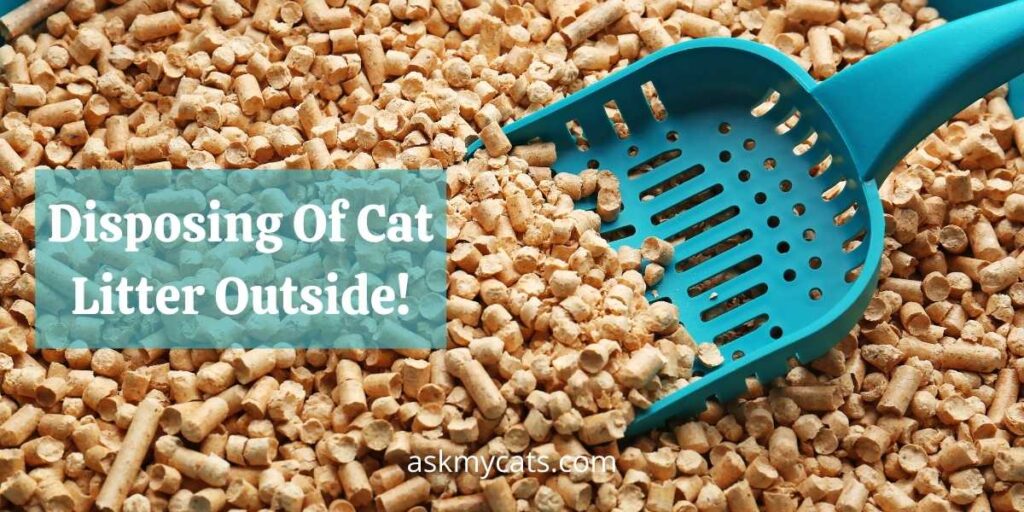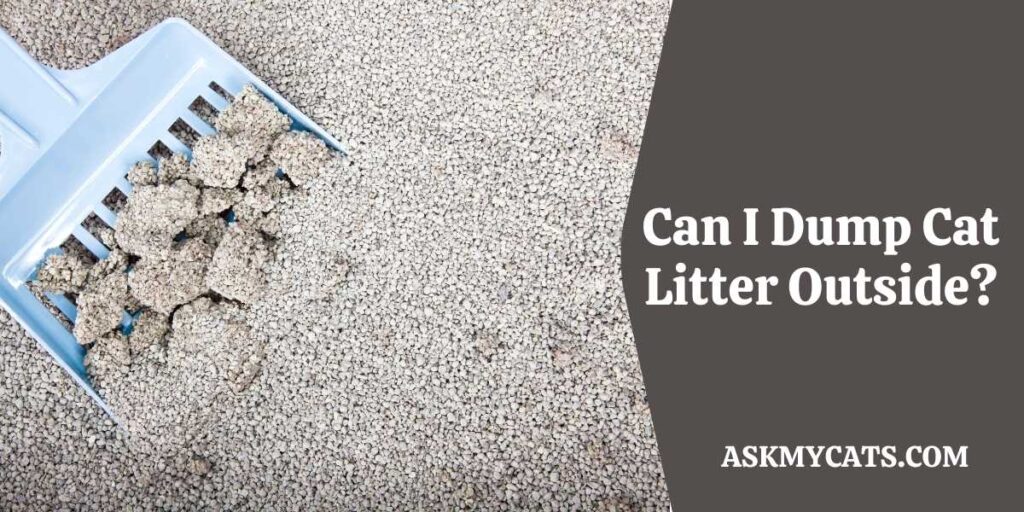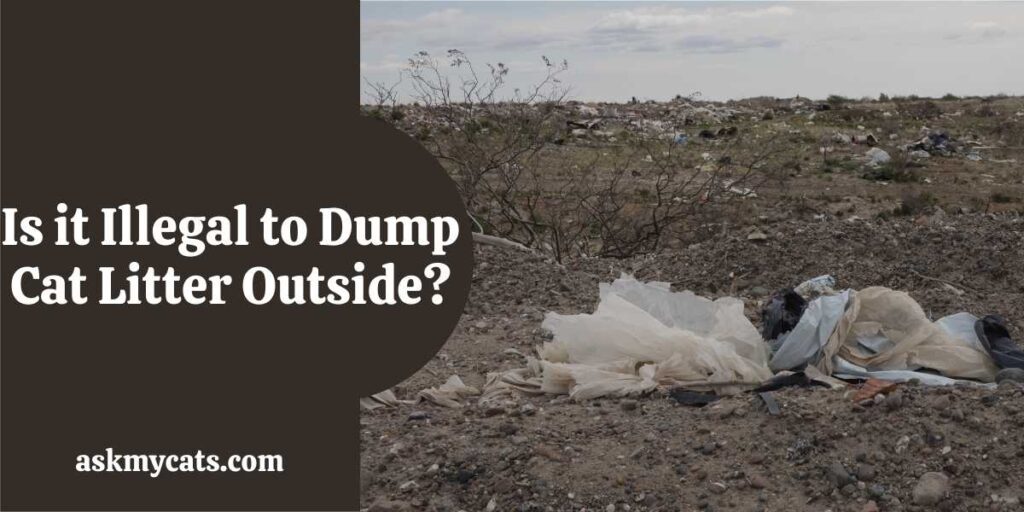There are several environmentally safe and green ways to dispose of cat litter, each with its own set of benefits and drawbacks.
There is no single solution that will work for everyone due to the broad range of cat litter available, the various wastewater treatment and sewer systems in each town, and the difficulties of composting cat faeces.
The simplest and most usual way to dispose of cat waste is to scoop it out of the box, carefully wrap it in a bag, and dump it in the garbage. A biodegradable kitty litter bag may appear to be an excellent choice.
Read the whole article to get a clear idea about how to dispose of cat litter outside.


Give Your Cat the Perfect Day
Get the Free Ebook!
Can I Dump Cat Litter Outside?
It is not advised to dump cat litter outside.

You’ll need first to figure out which type of litter is ideal for you and your fluffy companion. Litter nowadays is created from various components, ranging from potentially harmful to all-natural.
After that, you’ll have to figure out how you’ll get rid of the trash. (Flushing it down the toilet isn’t a good idea.)
Dog and cat waste are not the same thing. Cat waste may be dangerous to you and the environment if it is not correctly disposed of.
Being a green pet owner isn’t always simple, but it’s critical to consider all of your options before purchasing kitty litter to make the most environmentally-friendly choice.
Select a cat litter manufactured from natural ingredients that decompose and return to the environment. Look for recycled compacted paper, wood shavings, maize, grass seed, pine, wheat, and sawdust, among the materials.
The majority of biodegradable cat litter is derived from various plant-based items, and it can be more expensive than regular cat litter. Keep in mind that many popular cat litters include silica dust, linked to human upper respiratory diseases.
Also, stay away from litters with sodium bentonite (clay) or perfumes. Due to their extraction processes and chemical usage, these compounds are toxic to cats and the environment.
If you need to put the garbage in a bag before putting it in the trash, choose a brown paper bag. These require less time to decompose than plastic bags or even currently available biodegradable bags.
Is it Illegal to Dump Cat Litter Outside?
Dumping dirty cat litter on public grounds is prohibited and illegal due to the health risks linked with cat excrement. It’s also banned in most places to dump dirty kitty litter on your own private property.

It must be bagged and sent to the landfill, buried, or composted to be disposed of. Toxoplasma gondii, a parasite, is occasionally found in cat faeces, along with other parasites and diseases.
While T.gondii is usually innocuous to a healthy person, it can be dangerous to persons with weakened immune systems, pregnant women, and unborn children.
Cats mainly spread T.gondii. By disposing of dirty litter, you risk transmitting T.gondii to any wildlife or people who come into touch with the contaminated faeces, whether directly or indirectly.
T.gondii reproduces quickly in an infected cat’s intestines and sheds millions of oocysts when the animal eliminates. Oocysts which are the parasite’s egg form, may persist in soil for months and then are transferred by rains to streams and wetlands, where they can spread further.
In addition to the threats posed by Toxoplasma gondii, rotting pet excrement can pollute rivers by releasing ammonia and other pollutants, endangering fish and different aquatic life.
Only carefully regulated composting or bagging and sending to the landfill should be used to dispose of cat waste. Never been discarded or flushed.
Dumping garbage on public grounds is against the law, and filthy cat litter is no exception. However, in many locations, the rules for disposing of pet waste are significantly stricter.
Many jurisdictions make it unlawful to dispose of pet trash on your property due to the health risks involved with animal faeces.
These restrictions are more loose or ambiguous in some rural places. But that doesn’t make it okay to dump on your own land. You are still endangering wildlife and other people.
Can You Burn Cat Litter?
You should not burn cat litter.
If you live on a farm or in a remote region, you may consider holding a bonfire and burning the spent cat litter, as well as the rubbish.
Clay cat litter will not burn and remain in a clump at the bottom of a fire barrel rather than degrading. This may be a possibility if you’re utilizing environmentally friendly litter. On the other hand, any poisons may be airborne and hence potentially dangerous to your health.
Can I Dump Kitty Litter in the Woods?
You should not dump cat litter in the woods.
Even if you don’t expect any human interaction, dumping dirty kitty litter in the woods is unsafe. Toxoplasma gondii is a parasite that can spread far beyond your dumping site by entering streams or wetlands or by wildlife coming into touch with infected faeces.
Most commercial litter should be appropriately disposed of by placing it in a garbage bag and carrying it away to the landfill.
If you’re disposing of biodegradable cat litter, such as maize or wheat-based litter, you can put it in a flower garden; however, you should never throw litter away in an edible garden.
You may flush tiny amounts of litter down the toilet with just a few varieties of litter labelled as such.
Because of the possibility of contamination, you should make sure your cat’s old litter is correctly disposed of. Toxoplasmosis, a parasite illness carried by cat faeces, might be the source of the contamination.
Can I Throw Cat Litter In The Yard?
You can’t throw cat litter in the yard.

It’s critical to properly dispose of kitty litter since it’s better for both you and the environment!
Scoop the kitty litter into a bag and secure it with a rubber band. Then, place the old cat litter bag into another bag (double-bagged), tying both bags together to avoid leakage.
The trash bag should then be carefully stored until garbage pickup to prevent wild creatures from tearing it open.
You might be shocked to learn that the easiest method to get rid of commercial kitty litter is to throw it away at a landfill. This helps to prevent toxoplasmosis from spreading. It can also protect against chemical pollution, such as silica dust.
Throwing rubbish in the trash may seem illogical, given that we are constantly urged to limit our carbon footprint and that landfills pose a threat to the environment.
However, the danger of polluting our waterways or infecting our gardens is not worth it. There are several instances where ecologically beneficial methods of adequately disposing of cat litter are available.
It’s crucial to get rid of kitty litter the right way. You risk spreading infection or contamination if you don’t.
Toxoplasmosis, caused by parasite infection, can be transmitted by cats. This illness may be contracted by cats eating raw meat or other animals such as birds or mice. It is most commonly transmitted from feline to feline or humans by infected cat faeces.
Humans are usually unaffected by this, with flu-like symptoms or no symptoms at all. On the other hand, this virus may play havoc on pregnant women and those with immunological weaknesses, resulting in life-threatening effects.
As a result, not only should persons at risk avoid handling contaminated cat litter, but they should also ensure that the litter does not come into touch with their source of food, such as composting litter in an edible garden.
In addition to potentially infecting people, this illness has the potential to infect our aquatic pals. Toxoplasmosis is a disease that can be fatal to sea otters. As a result, polluted excrement mustn’t reach our rivers.
Can I Bury Cat Litter In My Garden?
You can bury your biodegradable cat litter, together with the cat’s excrement and urine, in a pretty garden, a dirt place, or some plant pots and use it as a natural fertilizer. The excrement of your cat will decompose in the soil.
Before digging holes in your yard, we recommend that you get permission. Ensure the holes aren’t close to waterways and the cat litter is biodegradable.
You’ll need to dig a hole someplace on your property that is out of the way, such as under a porch or off to the side where it won’t be dug up. Cover the hole with kitty litter that has been used. It’s better if it’s left alone for two years.
Some cat owners say composting cat excrement is possible; however, this can be hazardous to humans because T. gondii can be found in cat faeces.
If you’re going to use compost on or near edible gardening, don’t use pet waste. Pet faeces compost should only be used on lawns or non-edible crops (like a rose garden or perennials).
If you have the space in your backyard and don’t mind dealing with some highly nasty items, you can make your pet compost.
Keep in mind that it will necessitate a great deal of prudence and patience. Pet waste compost should be allowed to rest for at least a year before being used since it will require plenty of time and heat to kill any germs.
If you’re still interested in going this way, speak with a composting specialist in your area. It would be best if you got local professional guidance on whether or not to do it, as well as how to do it safely.
Never throw anything from your cat’s litter box into your city’s yard trash or composting bin. It will result in the entire contents of the container being thrown away, undermining the objective of composting.
Frequently Asked Questions
Is cat litter safe to dump outside?
You should never dispose of used kitty litter in the open. You may have a garbage burn pile or a fire barrel if you live in the country. However, clay litter does not burn properly. Instead, it will merely accumulate at the bottom of your stack.
What can you do with old cat litter?
To eliminate huge clumps of pee and other debris, scoop the litter box at least once a day. To avoid smells or spilling, scoop the waste into a tiny garbage bag and secure it. Because litter can grow rather heavy, make sure to use full garbage bags.
Can used cat litter be used in the garden?
It may be composted if your cat litter is composed of biodegradable components like pine, wheat, maize, or chicken feed! You may utilize them in the garden or on the balcony’s tree pot. The aroma of a cat will keep animals away from your plant while also enriching the soil.
Final Words
Dumping cat litter is against the law, terrible for the environment, and might hurt wildlife and others.
Composting, burying, bagging, and trashing dirty cat litter are the only acceptable means of disposal. Any other approach should be avoided, regardless of how easy it is.
Ask your questions in the comments section below.
